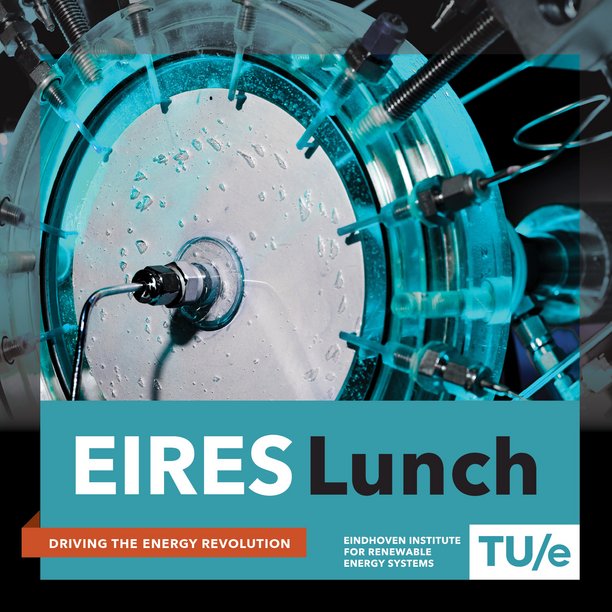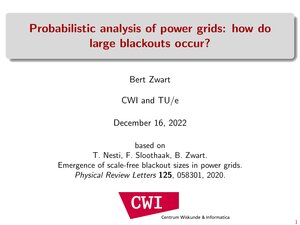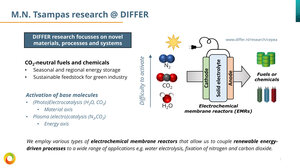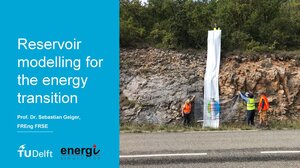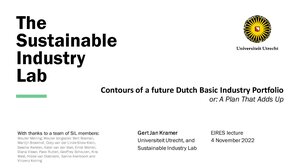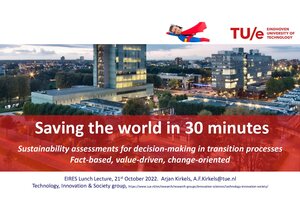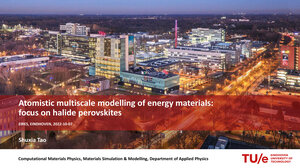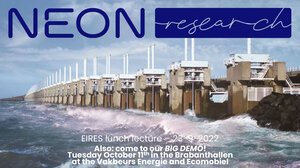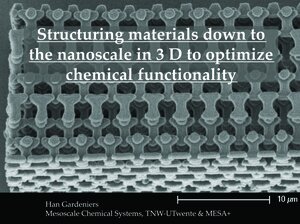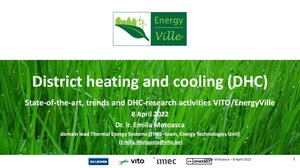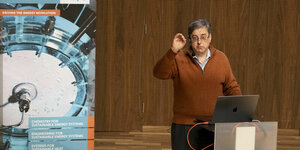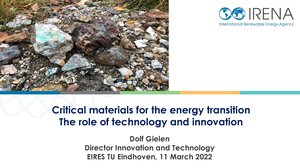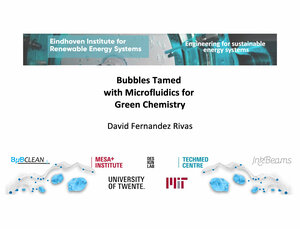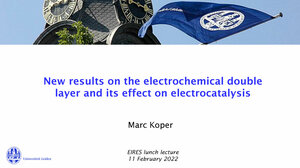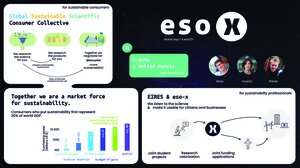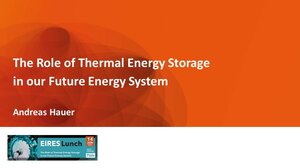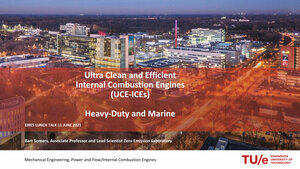EIRES Lunch | 16 December 2022
Topic & Program:
Probabilistic analysis of power grids: how do large blackouts occur?
Organized by:
EIRES | Focus Area - System Integration
Led by Principal Scientists:
Lisanne Havinga - Guus Pemen
Bert Zwart | Mathematics and Computer Science at TU/e & CWI stochastics group (Amsterdam)
Probabilistic analysis of power grids: how do large blackouts occur?
Securing a reliable power grid is of tremendous societal importance due to the highly disruptive repercussions of blackouts. Yet, the study of cascading failures in power grids is a notoriously challenging problem due to its sheer size, combinatorial nature, mixed continuous and discrete processes, physics and engineering specifications. Traditional epidemics models are unsuitable for its study, as the physics of power flow are responsible for a non-local propagation of failures. Consequently, many reliability studies focus on simulation. However, rare events occur by definition seldom, which can make the output of such simulation studies unreliable. It is therefore of crucial importance to derive mathematical insights into the nature of rare events which reveal possible weak spots in a network, and which can be used to speed up large-scale rare event simulation studies.
In this talk, Bert Zwart will give an example on how rare event analysis and extreme value theory can be used to analyze possible causes of large blackouts. He models power grids as graphs with uncertain supply and demands at the nodes, and study cascading failures on such graphs. He validates their results using various synthetic networks and the German transmission grid. This is joint work with Tommaso Nesti (CWI) and Fiona Sloothaak (TU/e).
EIRES Lunch | 02 December 2022
Topic & Program:
Electrochemical membrane reactors for energy applications
Organized by:
EIRES | Focus Area - Chemistry for Sustainable Energy Systems
Led by Principal Scientists:
Adriana Creatore - Marta Costa Figueiro
Michail (Mihalis) Tsampas | DIFFER - Dutch Institute For Fundamental Energy Research
Electrochemical membrane reactors for energy applications
With increasing global interest in renewable energy technology in the backdrop of climate change, storage of electrical energy has become particularly relevant. Most sustainable renewable technologies (e.g. wind, solar) produce electricity intermittently. Thus, converting electrical energy and base molecules (i.e. H2O, CO2, N2) into energy-rich ones (e.g. H2, CO, CH4, NH3) or chemical feedstock (e.g. NO, syngas) is of paramount importance. Energy transition requires the coupling of electrical, chemical, and thermal energy needs of the various industrial sectors. Electrochemical membrane reactors (EMRs) have the potential to be a large part of the solution. EMRs are based on dense polymeric or ceramic electrolytes, which can be directly controlled by an external electric current and on current collecting electrodes, which catalytically support electrochemical and other coupled reactions. Depending on the actual process design, a tailored combination of consumption/ production of electrical, chemical, and thermal energy is possible with EMRs. In this contribution, specific showcases will be discussed along with the challenges and perspective of EMRs for converting renewable energy and base molecules into valuable products.
EIRES Lunch | 18 November 2022
Topic & Program:
Reservoir modelling for the energy transition
Organized by:
EIRES | Focus Area - Systems for Sustainable Heat
Led by Principal Scientists:
Henk Huink - Silvia Gaastra-Nedea
Sebastian Geiger - Delft University of Technology
Reservoir modelling for the energy transition
Geoenergy applications beyond hydrocarbons will play an essential role in accelerating the energy transition: Carbon capture and storage (CCS) is one of the most important approaches to mitigate CO2 emissions; approximately 50% of the energy consumed in the northern hemisphere is needed for heating and cooling, and the expanded use of (shallow) geothermal energy could lead to significant CO2 reduction; the development of a hydrogen economy for power, transport, and production will rely on CCS for the generation of blue hydrogen and intermittent subsurface storage in geological formations or salt caverns for the generation of green hydrogen. All these new, low-carbon geoenergy applications need bespoke reservoir modelling approaches to estimate available pore volumes for storage reliably, capture how fluids with vastly different properties (e.g. hydrogen vs. hot water) interact with the reservoir geology, and quantify possible operational risks (e.g., early breakthrough of cold water during geothermal energy extraction). The geological uncertainties associated with these geoenergy applications can be significantly larger compared to hydrocarbon reservoirs because the characterisation of geoenergy reservoirs often relies on legacy data, for example 2D seismic lines for geothermal exploration rather than high-resolution seismic data for hydrocarbon exploration. This talk will explore how we can overcome existing limitations in static and dynamic reservoir modelling approaches to not only ensure that geological concepts are explored in an intuitive and efficient manner, but also that we end up designing meaningful reservoir models such that we can provide the reliable reservoir performance forecasts that are needed for new geoenergy applications to significantly impact our transition to a sustainable and just low-carbon energy future.
EIRES Lunch | 04 November 2022
Topic & Program:
Contours of a future Dutch Basic Industry Portfolio
How renewable power, green hydrogen and circular carbon might reshape industry
Organized by:
EIRES | Focus Area - Engineering for Susttainable Energy Systems
Principal Scientists:
Niels Deen - John van der Schaaf
Gert Jan Kramer | Utrecht University
Contours of a future Dutch Basic Industry
In this EIRES lecture Gert Jan Kramer presented a high-level view of how renewable energy and green hydrogen in combination with ‘circular carbon’, i.e. carbon from biomass and waste, can form the basis for the transformation of the Dutch basic industry, specifically that of future fuels and chemicals. The story was developed within the Sustainable Industry Lab, a think tank set up to explore the future of Dutch industry in the context of the energy transition and the drive towards a circular economy.
Moving away from oil and gas towards renewables and alternative sources of carbon implies an industrial transformation under constraints: there are limits in the availability of both renewable energy and of circular carbon. The global availability of each might ultimately lead to a redistribution of basic industrial production across the world. In that context I present an assessment of the Netherlands.
The story is built around a simple model assessment of green hydrogen production in a power system that is dominated by wind and solar supply. The large offshore wind potential of the Netherlands offers a significant green energy resource for industrial use, even after the other main sectors of the Dutch energy system – transport and the built environment – have been fully serviced. Sources of circular carbon will have to significantly rely on imports since domestic resources are insufficient for an export-oriented industry. Together, these strands of analysis provide the high-level contours of the direction of industrial transformation. We have found that such an analysis provides that a basis for a broader societal debate, especially around the role of future imports of energy and carbon. To have such a debate is key to chart a course to a sustainable industrial portfolio.
EIRES Lunch | 21 October 2022
Topic & Program:
Saving the world in 30 minutes
Sustainability assessments for decision-making in transition processes
Organized by:
EIRES | Focus Area - System Integration
Led by Principal Scientists:
Lisanne Havinga - Guus Pemen
Arjan Kirkels | Technology, Innovation, Society group - IE&IS - TU/e
Saving the world in 30 minutes
Sustainability assessments for decision-making in transition processes
Sustainability problems are one of the grand challenges of the 21st century. Overcoming these requires an energy transition. Such a transition involves large-scale and radical transformations of our economies and societies: new rules, practices, roles, and new technologies (e.g., batteries, hydrogen, solar cells). Assessments play a crucial role in supporting and accelerating transition processes. First, to better understand the impact of these new technologies. Second, to better understand whether these new technologies will become applied or not. And third, to understand what actions need to be taken to make this happen. It requires assessments of complex situations. In this lunch lecture, Arjan Kirkels will defend that good assessments are fact-based, value-driven, and change-oriented. He will explore this research field and its potential contribution. And he will identify several research lines that deserve our interest.
Arjan Kirkels | Technology, Innovation, Society group - IE&IS - TU/e
Saving the world in 30 minutes
Sustainability assessments for decision-making in transition processes
Sustainability problems are one of the grand challenges of the 21st century. Overcoming these requires an energy transition. Such a transition involves large-scale and radical transformations of our economies and societies: new rules, practices, roles, and new technologies (e.g., batteries, hydrogen, solar cells). Assessments play a crucial role in supporting and accelerating transition processes. First, to better understand the impact of these new technologies. Second, to better understand whether these new technologies will become applied or not. And third, to understand what actions need to be taken to make this happen. It requires assessments of complex situations. In this lunch lecture, Arjan Kirkels will defend that good assessments are fact-based, value-driven, and change-oriented. He will explore this research field and its potential contribution. And he will identify several research lines that deserve our interest.
EIRES Lunch | 06 October 2022
Topic & Program:
Atomistic multiscale modelling of energy materials: focus on halide perovskites
Organized by:
EIRES | Focus Area - Chemistry for Sustainable Energy Systems
Led by Principal Scientists:
Adriana Creatore - Marta Costa Figueiro
Shuxia Tao | Computational Materials Physics at MSM group, Department of Applied Physics, TU/e
Atomistic multiscale modelling of energy materials: focus on halide perovskites
Perovskites is a class of materials with notable crystal structure of ABX3, exceptionally wide tunability in chemical compositions and dimensionality in crystal-structures. Due to their exceptional optoelectronic properties, they are widely used for converting and storing (solar) energy, e.g. oxide perovskites as photocatalysts, halide perovskites as absorbers in solar cells, nitride perovskites as mechanical energy harvesters. In these applications, the understanding of optoelectronic properties, chemical stability and their changes upon external stimuli (light excitation, mechanical, thermal and chemical stress) are paramount.
In this talk, Shuxia Tao will show how she and her group investigate these properties using atomistic multiscale modelling by combing electronic structure calculations with reactive molecular dynamics simulations. Her focus is on halide perovskites and the impact of defects on the efficiency and the stability of perovskite solar cells. They identify harmful defects which lead to either recombination losses and/or chemical degradations and show several strategies to mitigate and passivate these defects. These include engineering the composition of perovskite absorbers, optimizing interfaces with contact materials, and finetuning growth conditions. The atomistic insights provide a basis for further improving the efficiency and stability of perovskite materials and devices. The multiscale computational framework can be enhanced with the emerging data-driven approach and straightforwardly applied to other materials and applications.
EIRES Lunch | 23 September 2022
Topic & Program:
NEON research: lighting the way to zero emission energy and mobility
Organized by:
EIRES | Focus Area - System Integration
Led by Principal Scientists:
Lisanne Havinga - Guus Pemen
Auke Hoekstra | NEON Director research at Eindhoven University of Technology
Lighting the way to zero emission energy and mobility
Auke Hoekstra is an academic researcher at the Eindhoven University of Technology. He is also the initiator and director of the NEON research program and founder of ZEnMo Simulations. Both model how we can quickly transition away from fossil fuels using a bottom-up agent-based methodology that respects individual freedom, heterogeneity, and technological learning. He is informally known as “debunker in chief” on twitter, where he often corrects misinformation about electric vehicles.
EIRES Lunch | 22 April 2022
Topic & Program:
3D fabrication methods for electrochemical and catalytic applications
Organized by:
EIRES | Focus Area - Chemistry for Sustainable Energy Systems
Led by Principal Scientists:
Adriana Creatore - Marta Costa Figueiro
Prof. Han Gardeniers - University of Twente - Mesoscale Chemical Systems group, TNW facultyStructuring materials down to the nanoscale in 3 D to optimize chemical functionality
The Mesoscale Chemical Systems group at the University of Twente carries out applied research of a multidisciplinary nature, with topics ranging from microelectronics, microfluidics and sensors to structured materials for photo, electro and thermal catalysis and their implementation in chemical reaction or separation equipment. Besides silicon-based fabrication processes, typically carried out in the MESA+ NanoLab, the group studies Additive Manufacturing (3D printing) methods like 2-photon stereolithography and electrospinning of inorganic materials, such as alumina and zirconia, with additives for specific optical, chemical or electronic functionality.
This presentation will focus on the development of 3D fabrication methods with sub-micron resolution, the structural and compositional characterization of the obtained materials and device structures, as well as their testing in electrochemical and catalytic applications. In addition, an overview will be given of recent research in the group that aims to miniaturize instrumentation for chemical analysis.
EIRES Lunch | 08 April 2022
Topic & Program:
District heating and cooling (DHC) - state-of-the-art, trends and DHC-research activities at VITO Belgium
Organized by:
EIRES | Focus Area - Systems for Sustainable Heat
Led by Principal Scientists:
Henk Huink - Silvia Gaastra-Nedea
Dr.ir. Emilia Motoasca | VITO NV Belgium – group Thermal Energy Systems
District heating and cooling (DHC) - state-of-the-art, trends and DHC-research activities at VITO Belgium
District heating and cooling is seen as one of the main possible solutions for the decarbonization of residential heating and cooling towards 2030 – 2050. Despite the fact that collective heating solutions have a long standing tradition in the Nordic heat dominated countries research for better, more efficient and better integrated DHC solutions in the neighborhoods is still on-going. Various older generations of DHC networks, at higher operating temperatures, some heavily based on fossil fuels as oil and gas are still in operation at higher and some of them in need of refurbishments while newer, more advanced generations of DHC, at low and ultralow operating temperatures and making use of renewable, local energy resources are designed and built in various countries. Making use of the available data to optimize their operation and detect, diagnose and correct the possible faults are among the current research activities within VITO. In-depth research into the design, optimization and deployment of newer generations DHC networks while accounting for the technical, economic, legal, social and environmental boundary conditions is also one of the core-expertise of VITO.
EIRES Lunch | 18 March 2022
Topic & Program:
Europe’s Land Future: Implications of the EU’s Fit for 55 Plan on Land Use, Climate Change, and Biodiversity
Organized by:
EIRES | Eindhoven Institute for Renewable Energy Systems
Led by:
David Smeulders - TU/e | Mechanical Engineering | Energy Technology
Missed the lecture?
Timothy D. Searchinger - Princeton University
Europe’s Land Future: Implications of the EU’s Fit for 55 Plan on Land Use, Climate Change, and BiodiversityLand use plays an important role in the European Commission’s proposed Fit for 55 Plan. Statements supporting the plan claim that it will tackle climate change by sequestering more carbon in Europe and that it will also help to improve biodiversity. Europe’s stage of development makes it possible for Europe to reduce the area of land it needs to feed itself. With the right policies, more land could become freed from agricultural use to reestablish forests, valuable habitats and to eliminate Europe’s net reliance on foreign land for agricultural products. The energy provisions of the plan, however, create vast incentives to dedicate land and forest resources to bioenergy. As a result, Commission modeling indicates that little to no extra land in Europe will be available to store more carbon or to improve biodiversity. Europe will also likely continue to rely heavily on agricultural land in the tropics for its agricultural products, contributing to global forest and habitat loss. This talk will explore the opportunities for European land to help address the climate and biodiversity crises. It will also discuss the likely consequences of the proposed Fit for 55 plan, and ways the plan could be improved.
EIRES Lunch | 11 March 2022
Topic & Program:
Critical materials for the energy transition – an engineering perspective
Organized by:
EIRES | Eindhoven Institute for Renewable Energy Systems
Led by:
Heleen de Coninck | TU/e - Industrial Engineering and Innovation Sciences, Technology, Innovation & Society
Interesting article:
Critical minerals and materials: supply bottlenecks and risks need international cooperation
Dolf Gielen | International Renewable Energy Agency - IRENA
Critical materials for the energy transition – an engineering perspectiveEnergy transition will result in an increased demand for critical materials. Product and materials engineering can mitigate this demand growth. This presentation will elaborate on the various types of critical materials for the energy transition, the supply and demand situation and outlook, as well as economics and investment needs. Special attention will be focused on battery materials and permanent magnets.
EIRES Lunch | 25 February 2022
Topic & Program:
Bubbles tamed with Microfluidics for Green Chemistry
Organized by:
EIRES | Focus Area - Engineering for Sustainable Energy Systems
Led by Principal Scientists:
Niels Deen - John van der Schaaf
Prof. David Fernandez Rivas | University of Twente | Faculty of Science and Technology | Research Affiliate MIT
Bubbles tamed with Microfluidics for Green Chemistry
David Fernandez Rivas shared with us what keeps members of his team focused on the context of GreenChemistry. The team is investigating sustainable solutions for chemical engineering processes. Within the consortium Netherlands Center for Multiscale Catalytic Energy Conversion (MCEC) they are tackling unexplored aspects of electrochemistry. Using microfluidics and process intensification, they have gained knowledge useful for designing new electrodes, for hydrogen evolution. David Fernandez Rivas also shared his vision on the need for Engineers to nurture durable skills such as Empathy and Persuasiveness, aided by a novel method to compare alternatives during innovation: the intensification factor.
EIRES Lunch | 11 February 2022
Topic & Program:
New results on the electrochemical double layer and its effect on electrocatalysis
Organized by:
EIRES | Focus Area - Chemistry for Sustainable Energy Systems
Led by Principal Scientists:
Adriana Creatore - Marta Costa Figueiro
Marc Koper | Leiden University - Catalysis and surface chemistry
New results on the electrochemical double layer and its effect on electrocatalysis
In this talk, Marc Koper presented some new results on the structure of the electrochemical double layer of platinum and gold single crystal electrodes. He also showed that the Gouy-Chapman-Stern theory cannot explain the double layer capacitance of these interfaces, not even at low electrolyte concentrations. Based on these observations, Marc Koper suggested a new model for the electrochemical double layer. He then discussed how this double-layer structure, or more specifically cations in the electrochemical double layer, may affect the kinetics of electrocatalytic CO2 reduction, both the activity itself ànd the competition with hydrogen evolution.
EIRES Lunch | 28 Janaury 2022
Topic & Program:
eso-x: innovating the interaction between consumers, businesses, and governments
Organized by:
EIRES | Eindhoven Institute for Renewable Energy Systems
Led by:
Richard van de Sanden | scientific director EIRES
Peter Rindt - eso-x
eso-x: innovating the interaction between consumers, businesses, and governments
In this talk we introduced eso-x, the new partner company of EIRES. Eso-x is a startup company with the ultimate goal of accelerating the sustainability transition as a whole. To achieve this goal, eso-x intends to radically innovate the interaction between consumers, big corporations and governments, and to improve the adoption and usage of scientific insights. In practice eso-x is best described as a: science-based sustainable consumer collective. As such, it will make scientific insights regarding sustainability directly understandable and usable for consumers, thus allowing them to knowledgeably question businesses and governments. From an ideological viewpoint, however, eso-x can be better described as a: United People. In this talk eso-x was introduced in more detail. We explained possibilities for professional collaboration with EIRES, and additionally explain how you personally can interact with eso-x.
EIRES Lunch | 14 January 2022
Topic & Program:
The Role of Thermal Energy Storage in our Future Energy System
Organized by:
EIRES | Focus Area - Systems for Sustainable Heat
Led by Principal Scientists:
Henk Huink - Silvia Gaastra-Nedea
Andreas Hauer | Bavarian Center for Applied Energy Research, ZAE Bayern
The Role of Thermal Energy Storage in our Future Energy System
Today more than 50 % of our final energy demand in developed countries is thermal – either heating or cooling demand. Concerning CO2 emissions it shows a similar picture: The thermal sector causes twice the amount of emission as the mobility sector! Projections for our future energy system show, that thermal energy will become even more relevant. In this context thermal energy storage technologies can contribute substantially to the integration of renewable energies and to an increase in energy efficiency and by this finally to the reduction of CO2 emissions.
The available thermal energy storage technologies are able to match the diversity of possible in the building and industrial applications. Technology developments in all thermal storage approaches – sensible, latent and thermochemical – were quite impressive over the last years. However the always changing requirements for possible application fields have to be taken into account as well. The presentation shall bring together and illustrate latest technology innovations and new application requirements.
The general trends in our energy systems – rising fraction of renewable energies and the holistic approach to overcome sector boundaries – offer new possibilities for thermal energy storage. Thermal energy storage solutions can substantially contribute to the integration of renewable sources, may it be directly from solar thermal or by power-to-heat technologies from PV or wind power. In addition to that sector coupling offers new options for promising applications of thermal storage systems. In conjunction with the electricity sector thermal storage can utilize higher temperature levels, which enables innovative high temperature storage approaches to evolve. Latest developments and actual examples will be presented.
Bart Somers – TU/e | Mechanical Engineering
Overview of de-fossilization options for heavy-duty engines
The lecture of Bart Somers will give an overview of the options to de-fossilize Heavy-Duty (and Marine) Internal Combustion Engines. To put it in perspective, first the two main representatives of Combustion Engines and their respective fuels are introduced. After that the many different sustainable fuels that emerge are presented and discussed in how they can be used in engines. However there exist pathways that create a win-win situation with respect to local and global emissions. Several of these sustainable fuels are excellent candidates to be applied in so-called advanced combustion concepts: Reactivity Controlled Compression Ignition (RCCI) and Partially Premixed Combustion (PPC). Extensive literature is available that report ultra-low emission levels of NOx and Soot in combination with a superior thermal efficiency (up to 59%) creating this win-win situation. Hence these concepts have been a focal point of our research and some results obtained with on our research engines will be shown.
